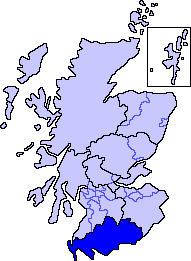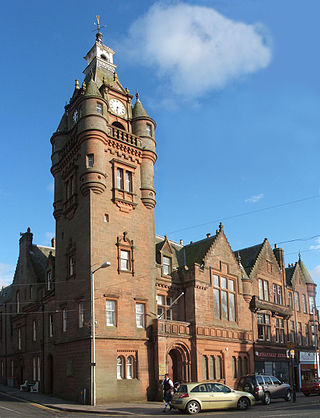
A sheriff court is the principal local civil and criminal court in Scotland, with exclusive jurisdiction over all civil cases with a monetary value up to £100,000, and with the jurisdiction to hear any criminal case except treason, murder, and rape, which are in the exclusive jurisdiction of the High Court of Justiciary. Though the sheriff courts have concurrent jurisdiction with the High Court over armed robbery, drug trafficking, and sexual offences involving children, the vast majority of these cases are heard by the High Court. Each court serves a sheriff court district within one of the six sheriffdoms of Scotland. Each sheriff court is presided over by a sheriff, who is a legally qualified judge, and part of the judiciary of Scotland.

District courts are a category of courts which exists in several nations, some call them "small case court" usually as the lowest level of the hierarchy.

In Scotland a sheriff principal is a judge in charge of a sheriffdom with judicial, quasi-judicial, and administrative responsibilities. Sheriffs principal have been part of the judiciary of Scotland since the 11th century. Sheriffs principal were originally appointed by the monarch of Scotland, and evolved into a heritable jurisdiction before appointment was again vested in the Crown and the monarch of the United Kingdom following the passage of the Heritable Jurisdictions (Scotland) Act 1746.

A procurator fiscal, sometimes called PF or fiscal, is a public prosecutor in Scotland, who has the power to impose fiscal fines. They investigate all sudden and suspicious deaths in Scotland, conduct fatal accident inquiries and handle criminal complaints against the police. They also receive reports from specialist reporting agencies such as His Majesty's Revenue and Customs.

A district court was the least authoritative type of criminal court of Scotland. The courts operated under summary procedure and dealt primarily with minor criminal offences. The district courts were administered by the district councils established under the Local Government (Scotland) Act 1973. Following the passage of the Criminal Proceedings etc. (Reform) (Scotland) Act 2007 by the Scottish Parliament, the Scottish Ministers abolished the district courts and transferred their functions to the justice of the peace courts, which are administered by the Scottish Courts and Tribunals Service and subject to the authority of the Lord President of the Court of Session.
Arthur Campbell Hamilton, Lord Hamilton,, is a Scottish judge and served as Lord Justice General and Lord President of the Court of Session from November 2005 until 8 June 2012, succeeding Lord Cullen.

Dumfries and Galloway Constabulary was the territorial police force responsible for Dumfries and Galloway, Scotland until 1 April 2013.
Criminal Justice Information Services is a department of the Scottish Police Services Authority. Previously called the Scottish Criminal Record Office (SCRO), it established in 1960 with a mission statement "To manage information for the Scottish Police Service, wider Criminal Justice Community and the public to assist in the prevention and detection of crime and enhance public safety." The organisation is based at Pacific Quay in Glasgow, under current Director John McLean.
Charles Eliot Jauncey, Baron Jauncey of Tullichettle, PC was a British judge and advocate. He was often praised as one of the finest legal minds of his generation in Scotland, and his legal opinions - both as a practising advocate and as a judge - commanded immense respect.
John Francis Wheatley, Lord Wheatley, PC is a Scottish lawyer and retired Senator of the College of Justice, a judge of the Supreme Courts of Scotland, sitting in the High Court of Justiciary and the Inner House of the Court of Session. He is an authority on road traffic law. His father, John Wheatley, Baron Wheatley, was Lord Justice Clerk between 1972 and 1985, the second-most senior judge in Scotland.
Robin Gilmour McEwan, commonly called Lord McEwan was a Scottish lawyer and former judge of the High Court of Justiciary and Court of Session, the country's Supreme Courts.
Iain Duncan Macphail, Lord Macphail was a Scottish lawyer and Senator of the College of Justice, a judge of the country's Supreme Courts.

A justice of the peace court is the lowest authoritative type of criminal court in Scotland. The court operates under summary procedure and deals primarily with less serious criminal offences.
A sheriffdom is a judicial district of Scotland. Originally identical to the Shires of Scotland, from the eighteenth century many counties were grouped to form "sheriffdoms".
John Stuart Mowat, was a Scottish Sheriff and Liberal Party politician.
The Sheriff of Dumfries and Galloway, was historically the royal official responsible for enforcing law and order in Dumfries and Galloway, Scotland. Prior to 1748 most sheriffdoms were held on a hereditary basis. From that date, following the Jacobite uprising of 1745, the hereditary sheriffs were replaced by salaried sheriff-deputes, qualified advocates who were members of the Scottish Bar.
The Sheriff of Stirling was historically the office responsible for enforcing law and order in Stirling, Scotland and bringing criminals to justice. Prior to 1748 most sheriffdoms were held on a hereditary basis. From that date, following the Jacobite uprising of 1745, the hereditary sheriffs were replaced by salaried sheriff-deputes, qualified advocates who were members of the Scottish Bar.
The Sheriff Principal of South Strathclyde, Dumfries and Galloway is the head of the judicial system of the sheriffdom of South Strathclyde, Dumfries and Galloway, one of the six sheriffdoms covering the whole of Scotland. The sheriffdom employs a number of legally qualified sheriffs who are responsible for the hearing of cases in five Sheriffs Court based in Airdrie, Ayr, Dumfries, Hamilton, Lanark and Stranraer. The current sheriffdoms were created in 1975 when the previous arrangement of 12 sheriffdoms was discontinued.
The Sheriff Principal of Tayside, Central and Fife is the head of the judicial system of the sheriffdom of Tayside, Central and Fife, one of the six sheriffdoms covering the whole of Scotland. The sheriffdom employs a number of legally qualified sheriffs who are responsible for the hearing of cases in eight Sheriffs Courts held in Alloa, Dundee, Dunfermline, Falkirk, Forfar, Kirkcaldy, Perth, and Stirling. The current Scottish sheriffdoms were created in 1975 when the previous arrangement of 12 sheriffdoms was discontinued.

Lockerbie Town Hall is a municipal building in the High Street in Lockerbie, Dumfries and Galloway, Scotland. The structure, which is used as a venue for the provision of local services, is a Category A listed building.




